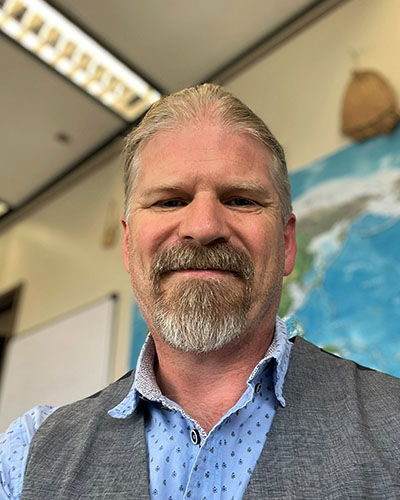
Marcus Hamilton
Associate Professor, Anthropology
Contact
Bio
I conduct research into human-environment interactions at all scales, from life history and demography, to population dynamics and biogeography. Much of my work focuses on hunter-gatherers and small-scale societies, but I am interested in the fundamental principles that underlie the evolutionary diversification of human ecology over time and space. Often this work involves comparative analyses among cultures and across species. I am particularly interested in how humans use energy and information to make inferences about their world and how these interactions underlie the ways humans modify their environments.
My archaeological research focuses on hunter-gatherer paleoecology, the colonization of the Americas, and Paleoindian North America. I am particularly interested in how humans adapted to North American landscapes in the late Pleistocene and later diversified across the continent. Currently, I am conducting field work into early Paleoindian period of the Rio Grande Rift Valley, New Mexico centered at the Mockingbird Gap Clovis site.
Human societies are complex adaptive systems structured by nonlinear, hierarchical, modular interaction networks of correlations that evolve in time and space. I work with data sets from several disciplines, including ethnography, archaeology, ecology, economics, and environmental science. My approach to theory-building is primarily mathematical where I use theory to generate hypotheses that make predictions that can be tested statistically with data. I am also interested in Bayesian theory, information theory, and the potential of machine learning in anthropology to explore the evolution and ecology of complex adaptive human systems.
Research Interests
- Anthropological archaeology
- Human ecology
- Hunter-gatherers
- Complex systems
- STEM
- Philosophy of Science
Degrees
- Ph.D. in Anthropology, University of New Mexico (2008)
- M.S. in Anthropology, University of New Mexico (2002)
- B.Sc. in Archaeology, University College London (1998)
Honors and Awards
Presentations
Grants, Patents and Clinical Trials
Publications
Hamilton, M.J., R.S. Walker and B. Buchanan. (2024) Institutional complexity emerges from ecological complexity in small-scale societies. Proceedings of the Royal Society: Biological Sciences 291, 20240246.
Hamilton, M.J., B. Buchanan, J. Lobo, and R.S. Walker (2024). Mobility costs and storage investments in the movement ecology of hunter-gatherers. Journal of Archaeological Science: Reports 13(1), 22448.
Buchanan, B. M.J Hamilton, N. Gala, H. Smith, M. Wilson, M. Eren, and R.S. Walker (2024). Comparing Clovis and Folsom fluting via scaling analysis Archaeometry 66(2), 266- 281.
Walker, R.S, M.V. Flinn, and M.J. Hamilton (2023). Remote sensing evidence for demographic growth in isolated Amazonian indigenous tribes. Scientific Reports 13(1), 22448.
Buchanan, B. and M.J. Hamilton (2023). Networks and cultural transmission in huntergatherer societies. In The Oxford Handbook of Archaeological Network Research, edited by J.L. Munson. Oxford University Press, Oxford, 459-473.
Hamilton, M.J. and M. Tallavaara (2022). Statistical inference, scale, and noise in comparative anthropology. Nature Ecology & Evolution 6,122.
Hamilton, M.J. (2022). Collective computation and the emergence of hunter-gatherer smallworlds. Journal of Social Computing 3(1):18-37.

